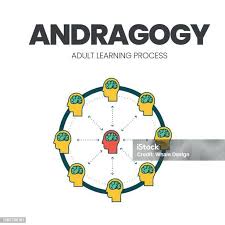Andragogi Profetik: Telaah Konsep Pendidikan Orang Dewasa Perspektif Hadis
##plugins.themes.academic_pro.article.main##
Abstract
Andragogy, defined as the art and science of teaching adults, is an educational approach that emphasizes learner autonomy, experience, needs, and motivation. In the practice of Islamic education, the educator (teacher) becomes one of the key components in effectively applying these principles. The perspective of hadith highlights that lifelong learning and the appreciation of life experience are integral parts of Islamic education. This study aims to explain the concept of adult education based on hadiths and to explore the andragogical principles that can be applied within Islamic educational practice. This research employs a qualitative approach using content analysis of relevant hadiths. The findings reveal that adult learning in Islam prioritizes an experience-based approach, addresses the actual needs of learners, and builds internal motivation to learn. Furthermore, the importance of patience, respect for experience, and effective communication are essential factors for success in educating adults, whose cognitive processes differ from those of children. This study develops the concept of "prophetic andragogy" as a model of transformative education grounded in prophetic values.
##plugins.themes.academic_pro.article.details##
References
- ‘Ulyan, M. (2020). ASPEK PENDIDIKAN ISLAM PROFETIK (TUJUAN, MATERI, STRATEGI, MEDIA, EVALUASI, LINGKUNGAN). As-Salam, IX(1), 61–74.
- Aini, N. (n.d.). Andragogi : Teori Pembelajaran Agama pada Usia Dewasa. Jurnal Pendidikan Islam, 2(2), 2021.
- Al-Buwayṭī, M. al-A. bin ‘Abdullah bin Y. bin Ḥasan al-U. al-‘Alawī al-H. al-K. (n.d.). Syarh Sunan Ibnu Majaḥ. Dar al-Minhaj, Saudi Arabia- Jedah, Ed 1439 H-2018 M.
- Al-Mubᾱrakfūrī, A. al-‘Alᾱ M. ‘Abdurrahman bin ‘Abdurrahim. (n.d.). Tuḥfat al-Aḥwadzī Syarh Jᾱmi’ al-Tirmidzī. Dar al-Kutub al-Ilmiyyah-Beirut.
- Al-Sijistani, A. D. S. bin al-A. al-A. (2009). Sunan Abu Dawud (S. Al-Arna’ut (ed.); 1st ed.). Dar al-Risalah al-Alamiyah.
- Anwar, B. (2017). Konsep Pendidikan Andragogi Menurut Pendidikan Islam. Al Daulah : Jurnal Hukum Pidana Dan Ketatanegaraan, 6(1), 28–48. https://doi.org/10.24252/ad.v6i1.4864
- Bukhāriy, A. ʻAbdillāh M. ibn I. ibn I. ibn al-M. al-J. al-. (1422). al-Jāmiʻ al-Musnad al-Ṣaḥīḥ al-Mukhtaṣar min Umūr Rasūl Allāh Ṣallā Allāh ʻalaih wasallam wa Sunanih wa Ayyāmih (M. Z. ibn N. al- Nāṣir (ed.); Vol. 9). Dār Ṭauq al-Najāt.
- Drs.Asmin, M. P. (n.d.). Konsep dan metode pembelajaran untuk orang dewasa andragogi. Konsep Dan Metode Pembelajaran Untuk Orang Dewasa, 18.
- Fajri, R., Alimin, R., & Herawati. (2024). Sosialisasi Penerapan Konsep Andragogi Dalam Pembelajaran Socialization of the Application of Andragogy Concept in Learning. Jurnal Pengabdian Masyarakat (Pendidikan), 6(1), 12–18.
- Ibn al-Ḥajjāj, M. (1955). al-Musnad al-Ṣaḥīḥ al-Mukhtaṣar bi Naql al-ʻAdl ʻan al-ʻAdl ilā Rasūl Allāh Ṣallā Allāh ʻalaih wasallam (M. F. ʻAbd al-Bāqī (ed.); Vol. 5). Dār Iḥyā’ al-Turāṡ al-ʻArabiy.
- Ismail, S. G. (2013). Implementasi Pendidikan Profetik dalam Pembelajaran Pendidikan Agama Islam. Mudarrisa: Jurnal Kajian Pendidikan Islam, 5(2), 299–324.
- Kurniawati, putri. (2017). andragogi (metode dan teknik memanusiakan manusia. In Universitas Nusantara PGRI Kediri (Vol. 01).
- Masduki, & Anwar, S. S. (2018). Filosofi Dakwah Kontemporer. In Sustainability (Switzerland) (I, Vol. 11, Issue 1). PT. Indragiri Dot Com. http://scioteca.caf.com/bitstream/handle/123456789/1091/RED2017-Eng-8ene.pdf?sequence=12&isAllowed=y%0Ahttp://dx.doi.org/10.1016/j.regsciurbeco.2008.06.005%0Ahttps://www.researchgate.net/publication/305320484_SISTEM_PEMBETUNGAN_TERPUSAT_STRATEGI_MELESTARI
- P. Panen & I.S. Melati. (2011). Pendidikan Orang Dewasa [Pendidikan Orang Dewasa]. Dedikasi, 2(3), 79–88.
- Rismana, N. (2021). EVALUASI PENDIDIKAN MENURUT HADIS. Dirasah : Jurnal Pemikiran Dan Pendidikan Dasar Islam, 12(1), 146–162. http://dx.doi.org/10.51476/ath
- Saruji, H., & Jumiati. (2020). KOMPETENSI PEDAGOGIK GURU AL-QUR’AN HADIS DALAM MENINGKATKAN HASIL BELAJAR PESERTA DIDIK DI MTs NEGERI MAIWA KABUPATEN ENREKANG. ISTIQRA’, 7(2), 99–109. https://doi.org/10.1016/j.jnc.2020.125798%0Ahttps://doi.org/10.1016/j.smr.2020.02.002%0Ahttp://www.ncbi.nlm.nih.gov/pubmed/810049%0Ahttp://doi.wiley.com/10.1002/anie.197505391%0Ahttp://www.sciencedirect.com/science/article/pii/B9780857090409500205%0Ahttp:
- Sujarwo. (2015). Strategi Pembelajaran Partisipatif Bagi Belajar Orang Dewasa (Pendekatan Andragogi). Majalah Ilmiah Pembelajaran, 3(2), 1–10.
- Wahono, Imsiyah, N., & Setiawan, A. (2020). Andragogi: paradigma pembelajaran orang dewasa pada era literasi digital. Jurnal Proceeding Universitas Muhammadiyah Surabaya, 517–527.
- Zaki, M. (2015). Metode Pemahaman Dan Pengamalan Hadits Jamaah Tabligh. Journal of Chemical Information and Modeling, 8(9), 116.

